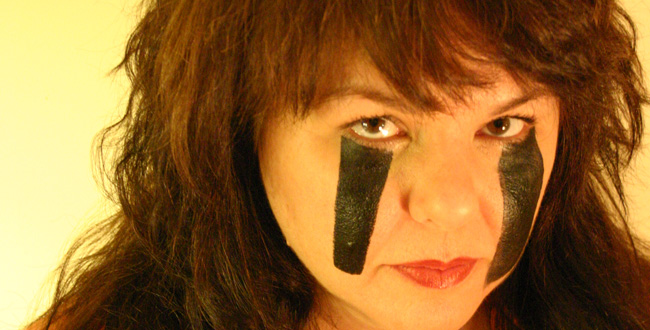‘Love to me is the kids’

By Dr. Lynn Gehl
I begin this article on Indigenous mothering with what social activist, new settler to Turtle Island, and new mother, Harsha Wallia argued during the Peoples’ Social Forum Unity March on Parliament Hill − unceded Algonquin territory – “an economic system, capitalism, that completely devalues and completely isolates the most important and difficult job on the planet – that is mothering − is an economic system that must be abolished”.
Many people know that I am in the process of a long and arduous section 15 Charter challenge regarding the never ending sex-discrimination in the Indian Act. I qualify here that the sex discrimination is not actually explicitly codified in the Act, rather there exists a silence on the matter of what to do in situations where a father’s signature is not on a child’s birth certificate, whereby the Registrar then interprets this silence in a way that prevents women who are registered under section 6(2) of the Indian Act from passing on Indian status registration to their children. Click on these links to learn more:
http://rabble.ca/news/2012/11/canada%E2%80%99s-court-system-hostile-place-indigenous-people
http://rabble.ca/news/2013/04/indian-act-legislative-silence-and-ongoing-sex-discrimination-canada
While many people know this, what many people do not know is that in the Indigenous tradition the practice of mothering and the love that mothers provided to children was particularly cherished in Indigenous communities and societies, so much so that it was valued that mothering was more of a social process, not constrained by biological constructs and determinations. This means that mothering children that were not one’s own biological offspring was common. In this way mothering is best understood through both a vertical and horizontal model. The historical record, the oral tradition and our sacred stories inform us of this inclusive reality of mothering.
The Historic Record
Although not without limitations, the historical record is a useful source in discussing the Indigenous family model.
In his work titled “Travels Through Canada and the United States of North America, in the years 1806, 1807, & 1808” John Lambert (1813) offered, “Among some of the groups of women I noticed three or four European children with light hair, whom they were nursing, and was informed that they frequently adopted the natural offspring of the white people whenever the latter abandoned them. Such instances, I think, may serve to show the fondness of the Indian women for children, and indeed no mothers can appear more tender of their offspring than they do. It is an amiable trait in their character, and must make the Europeans blush for that false pride and inhumanity which induce them to forsake their children.”
After assessing the needs of the Indians of Lower Canada, the 1845 Bagot Commission reported on child rearing practices and situations of the so-called illegitimate children stating, “an event of this nature does not cast a stigma upon the mother, nor upon the child, which is usually adopted into the tribe … ”.
Similarly, in his work on the Algonquin Anishinaabe Nation of the Ottawa River, Frank G. Speck (1915) reported, it was the Chief’s responsibility to take care of “orphaned children”. Furthermore, historian Gordon Day (1979) offered, “the basic unit of Algonquin society was the family: the father and mother, grandparents, children and adopted children” (p. 3).
The Oral Tradition
While the historic record reveals these valued tidbits of knowledge, my knowledge of the Indigenous family model also emerges from the oral stories my kokomis (grandmother in Algonquin) told me. Originally from Pikwàkanagàn First Nation, Ontario my kokomis was an Anishinaabemowin language speaker and storyteller. Several times she recited to me the story about her kokomis Angeline Jocko. Angeline, a Mohawk woman from the Lake of Two Mountains, was born around 1825 and that in 1844, when she was nineteen years old, that she married Joseph Gagnon, Sr. Despite having several biological children of her own, my kokomis explained, Angeline adopted two little boys named little Paul Jocko (possibly a sibling’s son) and Moses Martell.
Our Sacred Stories
In addition, within the Anishinaabeg knowledge tradition there are many ancient and sacred stories about Ashkaakamigo-Kwe (Mother Earth), Nokomis Dibik-Giizis (Grandmother Moon), Giizhigoo-Kwe (Sky Woman), Manitou-Kwe (Spirit Woman), and Wenonah (The First Breast Feeder). Anishinaabeg stories teach us that in their role as creators and nurturers of life, these mothers loved all children regardless of what western culture refers to as illegitimacy and non-paternity disclosure. Through these ancient stories the Anishinaabeg continually learn that all children are valued as gifts from Creator and all are deserving of the love needed to achieve mino-pimadiziwin, meaning the good life.
Mothering and the work that mothers do was and is valued in Indigenous communities. It is said that through the work that mothers do they are located closer to the Creator and natural law and that is where their truth emerges from.
While my original court date was scheduled for May 2014 through some unknown administrative glitch, this date was lost. My new court dates, where the summary judgement motion will be heard in the Superior Court of Justice located at 393 University Avenue, Toronto, are now set for October 20, 21, and 22, 2014.
Dr. Lynn Gehl is an Algonquin Anishinaabe-kwe from the Ottawa River Valley. She has a section 15 Charter challenge regarding the continued sex discrimination in The Indian Act, and is an outspoken critic of the Ontario Algonquin land claims and self-government process. She has three books: Anishinaabeg Stories: Featuring Petroglyphs, Petrographs, and Wampum Belts, The Truth that Wampum Tells: My Debwewin of the Algonquin Land Claims Process, and Mkadengwe: Sharing Canada’s Colonial Process through Black Face Methodology. You can reach her at lynngehl@gmail.com and see more of her work at www.lynngehl.com.


